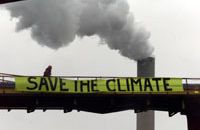THE CARBON DIOXIDE FACTOR
In the
last 100 years, since industrialization took off in now developed
countries around the world, human activity has added close to 24
billion tons of carbon dioxide (CO2) per year to the naturally
occurring amount of CO2 cycling through the earth's systems
(roughly 800 billion tons). Atmospheric concentrations of CO2 are
predicted around 32% higher than 150 years ago. Along with this
additional CO2, the average global air temperature has risen
roughly 0.5% Celsius, with the ten warmest years on record
occurring since 1980. As this global warming occurs, scientists
around the world are researching and hypothesizing the resulting
change in climate that is likely to occur. This change in climate
from global warming has primarily been linked to the increased
amount of CO2, but also to other heat-trapping-gas emissions such
as methane (CH4), nitrous oxide (N2O), and chlorofluorocarbons
(CFCs). Between 1987 and 1996, global atmospheric concentrations
of both carbon dioxide and methane have increased by 4%, while
nitrous oxide has increased by 2.2%. In addition, according to ice
core data, the current global atmospheric concentration of carbon
dioxide, at 360ppm, is thought to be the highest in 220,000 years
of ice core data.

Car emissions
are not solely responsible for increased levels of carbon dioxide
in the atmosphere. Industrial factories, power plants, oil
refineries and deforestation all contribute to the level of carbon
dioxide. Of all types of fossil fuels, coal is the most carbon
intensive, meaning it has the highest amount of CO2 emitted from
each unit of primary energy*. In addition to coal (the principle
fossil fuel used over the last century), oil and natural gas have
also contributed to the volume of carbon emissions.
Strangely
enough, carbon dioxide is considered the least effective
greenhouse gas, compared to the others on a per mole basis,
however, because if its high rate of increase, it is currently
responsible for close to 60% of greenhouse action. As fossil fuel
use emits a large amount of carbon dioxide into the atmosphere,
the rate of fossil fuel increase in the future become critical:
"The rate of increase during the period before 1973 was 4.3% per
year; since then it has been about 2.5% per year. If we assume a
2% growth rate in the use of fossil fuels and an airborne fraction
of 0.55, then the pre industrial level of CO2 will double to
550ppm by about 2053" *. Essentially, we need to curtail emissions
of CO2 and other heat-trapping-gases immediately to prevent
further human-induced global warming.
See chart :
http://www.ucsusa.org/warming/gw.science.html
As of today,
documented changes in climate include:
-a global mean
temperature rise (night-time minimums increasing more than
day-time maximums),
-the 10 warmest
years on record since 1980,
-a rise in sea
level of 10-25 cm due to thermal expansion of the
oceans,
-a steady
increase in the mean annual air temperature of Antarctica since
the 1950's.
Scientists
are currently working to determine the extent to which these
changes can be attributed to human activity. Through the
Intergovernmental Panel on Climate Change (IPCC), scientists and
experts from around the world have combined research and theories
on climate change in an attempt to provide more concise, objective
answers for the general public. Climate change research, still in
somewhat early stages, can be speculative and frequent to
refinement, as scientists learn more about the earth's systems.
 Greenpeace
Greenpeace
Sources:
*Gates, David. Climate Change and
its Biological Consequences. Sunderland, Mass. Sinauer Associates,
c1993.
Hare, Bill. Fossil Fuels and
Climate Protection: The Carbon Logic. Greenpeace International.
(www.greenpeace.org).
Environment Canada: Climate Change
- Indicator: Global atmospheric concentrations of greenhouse gases
(www.ec.gc.ca/Ind/english/Climate).
The National Council for Science
and the Environment. Morrissey, W.A. and Justus, J.R. Resources,
Science, and Industry Division. The Congressional Research Service
Issue Brief- Global Climate Change: Science and Policy, Sept.
19, 2000. IB89005.
Union of Concerned Scientists -
The Science of Global Warming
(www.ucsusa.org/warming/gw.science.html).
Back
to Climate Change
Back
to Home

 Greenpeace
Greenpeace